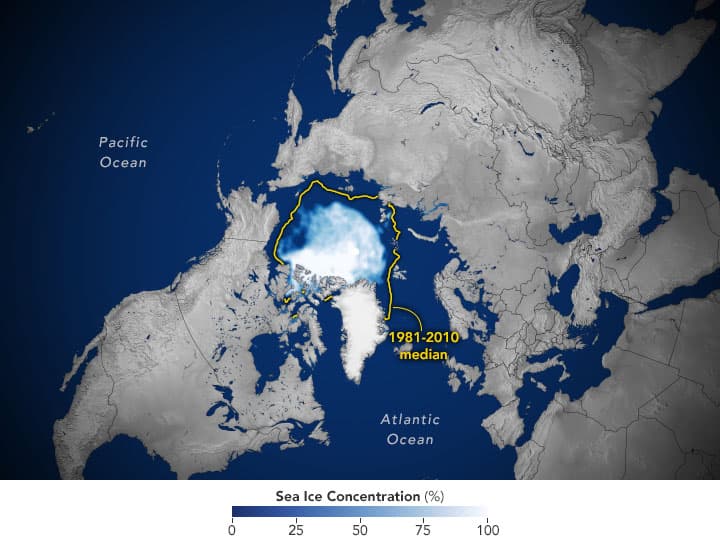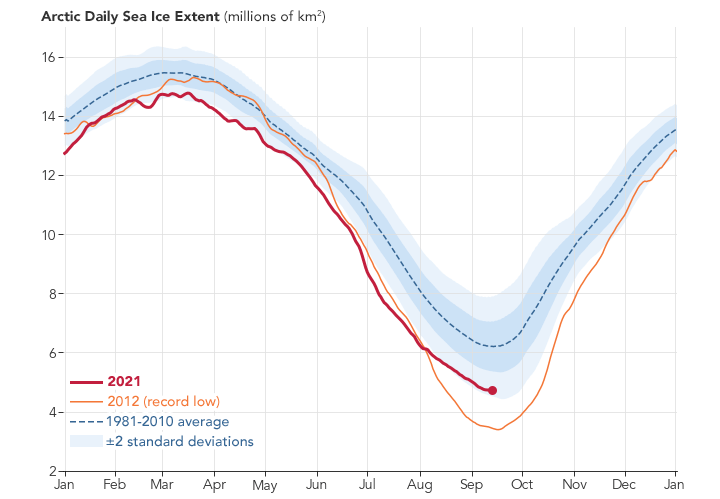
‘Arctic Sea Ice 12th-Lowest on Record’ first appeared on NASA Earth Observatory and was written by Kathryn Hansen.
Sea ice in the Arctic Ocean and neighboring basins appears to have hit its annual minimum extent on September 16, 2021, after waning in the spring and summer. The summertime extent is the twelfth lowest in the satellite record, according to scientists at the National Snow and Ice Data Center and NASA.
The map at the top of this page shows the sea ice extent on September 16, 2021. The ice extent (white) on that day—defined as the total area in which the ice concentration is at least 15 percent—measured 4.72 million square kilometers (1.82 million square miles)—higher than recent years. Sea ice extents in 2020 and 2019 were the second and third lowest on record at 3.74 million square kilometers in 2020 and 4.14 million in 2019.
Less sea ice melted in 2021 even as the planet as a whole was warmer than usual—with new temperature records in North America and Eurasia, drought in the U.S. West, and episodes of intense melting on Greenland’s ice sheet. But farther north, conditions stayed generally cool and stormy across the Arctic Ocean. For much of the summer, low pressure over the Arctic brought cloudy skies, which limits the amount of sunlight that can reach the ice and spur melting. Storms can also spread the ice out, slowing the decline of its extent.
Such differences from place-to-place and year-to-year are to be expected. “I don’t see any inconsistency with the Arctic sea ice extent not breaking any records this year despite global temperatures being high,” said Claire Parkinson, a sea ice scientist at NASA’s Goddard Space Flight Center. “The key is that the Earth is large and there are differences regionally.”
“We don’t expect sea ice to be lower every year, just like we don’t expect temperatures to be warmer everywhere on Earth every year even with global warming.”
– Walt Meier, a sea ice researcher at the National Snow and Ice Data Center

Long-term trends are more important than any single year, and those trends are still pointing strongly downward. The 15 lowest minimum extents in the 43-year satellite record have all occurred in the past 15 years (2007 to 2021).
Sea ice is also trending younger and thinner; that is, there is less multi-year ice that survives a summer season and thickens over the subsequent winter. According to Meier, data show that sea ice this summer contained the second-lowest amount of multi-year ice on record.
Parkinson and Meier think that this summer, plenty of ice was close to disappearing but never quite reached that point—maintaining extent but not thickness. “There does appear to be a fair amount of ice in the Beaufort and Chukchi Seas that seems to have gotten quite thin,” Meier said, “but there just wasn’t quite enough energy through the summer to melt it out completely.”
NASA Earth Observatory images by Joshua Stevens, using data from the National Snow and Ice Data Center. Story by Kathryn Hansen and Roberto Molar Candanosa/NASA’s Earth Science News Team.
Don’t bring facts to a feelings fight, SC!
Dave: According to a 2008 article Published in ‘Geophysical Research Letters’, researchers studying the balance of new ice and ice lost to calving determined ice in the eastern portion of Antartica is relatively stable with a very slight increase but ice is steadily decreasing in the western portion of Antartica creating an over ice loss in Antartica as a whole. A 2019 publication in the ‘Proceedings of the National Academy of Sciences’ determined that the net Antarctic ice loss has been accelerating over the past 40 years and quantified the increase at 280% over 4 decades. So, no, the Antarctic ice pack is not growing.
Please don’t try to fool people with lies. If you don’t want to do the research on the topic, just STFU.
But the Antarctic ice pack is growing…